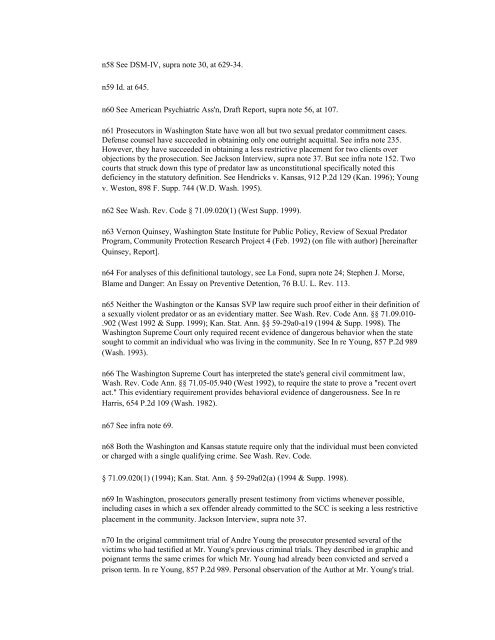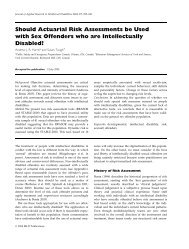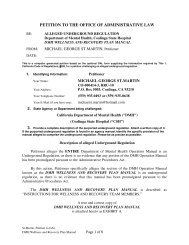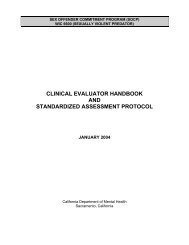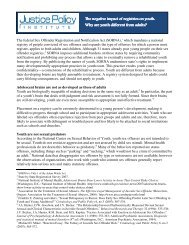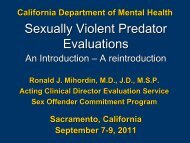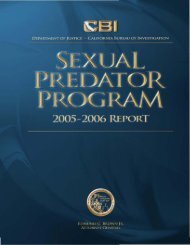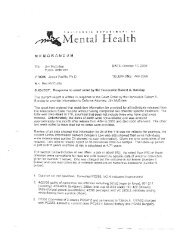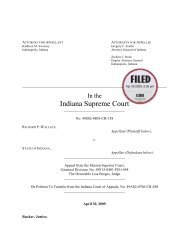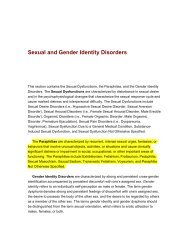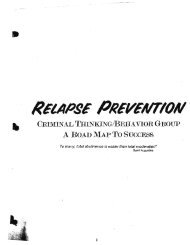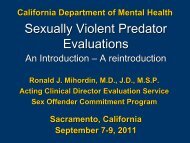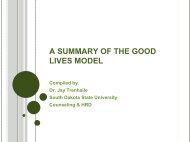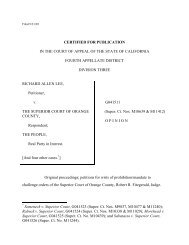Therapeutic Jurisp & Sexual Predator Laws - Defense for SVP
Therapeutic Jurisp & Sexual Predator Laws - Defense for SVP
Therapeutic Jurisp & Sexual Predator Laws - Defense for SVP
You also want an ePaper? Increase the reach of your titles
YUMPU automatically turns print PDFs into web optimized ePapers that Google loves.
n58 See DSM-IV, supra note 30, at 629-34.n59 Id. at 645.n60 See American Psychiatric Ass'n, Draft Report, supra note 56, at 107.n61 Prosecutors in Washington State have won all but two sexual predator commitment cases.<strong>Defense</strong> counsel have succeeded in obtaining only one outright acquittal. See infra note 235.However, they have succeeded in obtaining a less restrictive placement <strong>for</strong> two clients overobjections by the prosecution. See Jackson Interview, supra note 37. But see infra note 152. Twocourts that struck down this type of predator law as unconstitutional specifically noted thisdeficiency in the statutory definition. See Hendricks v. Kansas, 912 P.2d 129 (Kan. 1996); Youngv. Weston, 898 F. Supp. 744 (W.D. Wash. 1995).n62 See Wash. Rev. Code § 71.09.020(1) (West Supp. 1999).n63 Vernon Quinsey, Washington State Institute <strong>for</strong> Public Policy, Review of <strong>Sexual</strong> <strong>Predator</strong>Program, Community Protection Research Project 4 (Feb. 1992) (on file with author) [hereinafterQuinsey, Report].n64 For analyses of this definitional tautology, see La Fond, supra note 24; Stephen J. Morse,Blame and Danger: An Essay on Preventive Detention, 76 B.U. L. Rev. 113.n65 Neither the Washington or the Kansas <strong>SVP</strong> law require such proof either in their definition ofa sexually violent predator or as an evidentiary matter. See Wash. Rev. Code Ann. §§ 71.09.010-.902 (West 1992 & Supp. 1999); Kan. Stat. Ann. §§ 59-29a0-a19 (1994 & Supp. 1998). TheWashington Supreme Court only required recent evidence of dangerous behavior when the statesought to commit an individual who was living in the community. See In re Young, 857 P.2d 989(Wash. 1993).n66 The Washington Supreme Court has interpreted the state's general civil commitment law,Wash. Rev. Code Ann. §§ 71.05-05.940 (West 1992), to require the state to prove a "recent overtact." This evidentiary requirement provides behavioral evidence of dangerousness. See In reHarris, 654 P.2d 109 (Wash. 1982).n67 See infra note 69.n68 Both the Washington and Kansas statute require only that the individual must been convictedor charged with a single qualifying crime. See Wash. Rev. Code.§ 71.09.020(1) (1994); Kan. Stat. Ann. § 59-29a02(a) (1994 & Supp. 1998).n69 In Washington, prosecutors generally present testimony from victims whenever possible,including cases in which a sex offender already committed to the SCC is seeking a less restrictiveplacement in the community. Jackson Interview, supra note 37.n70 In the original commitment trial of Andre Young the prosecutor presented several of thevictims who had testified at Mr. Young's previous criminal trials. They described in graphic andpoignant terms the same crimes <strong>for</strong> which Mr. Young had already been convicted and served aprison term. In re Young, 857 P.2d 989. Personal observation of the Author at Mr. Young's trial.


